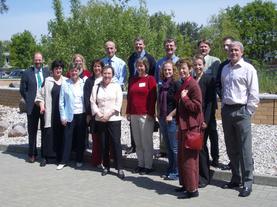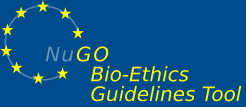- Home
- NuGO Guidelines
-
Definitions
-
Examples
-
Background
-
This is a static version of the NuGO Bioethics Guidelines Tool from 2007. Some links may be outdated. Searching is disabled. Please contact the authors for comments or questions
NuGO-GUIDELINES
on the treatment of ethical issues in human nutrigenomics research
Background
The combination of data from the genome mapping projects, especially the human genome, and the availability of high throughput tools for investigating the expression of genes, has enabled researchers to begin to investigate interactions between nutrition and the genome which affect cell function and, ultimately, human health. This is the science of human nutritional genomics or nutrigenomics. Although this is a young science, it is become clear already that food components can have profound effects on gene expression and also that an individual's genetic makeup can influence how that individual responds to specific nutritional exposures. Although many of the ethical issues associated with such studies are not different from those encountered in conventional nutrition research involving human volunteers, the power of the new studies to illuminate diet:gene interactions, the importance of undertaking genotypic characterisation of volunteers, the novel uses for materials (and associated metadata) stored in biobanks and the opportunities for faster progress through sharing biological materials and data between laboratories, have created a need for guidance for nutrigenomics researchers. This is especially the case where the new science has attracted researchers with limited experience of studies involving human volunteers or biological materials and data from such studies. In addition, the legislative and regulatory landscape which informs guidelines in this area has been changing rapidly in recent years.
Most international guidelines, recommendations and legislation regarding genetic information focus on monogenic disorders.
The genetic information acquired during nutrigenomics research, however, differs in an important aspect: Nutrigenomics research rarely deals with genetic information that determines an individual's health status, in fact nutrigenomics research uses genetic information where sometimes its relevance for health outcomes is not yet clear. Therefore, it is important to not put extraordinary emphasise on the genetics but also consider already established bioethics rules that have been valid for biomedical research in general.
Description of process
In January 2004, European Nutrigenomics Organization (NuGO, www.nugo.org) was founded by the European Commission's Research Directorate under the Food Quality and Safety Priority of the Sixth Framework for Research and Technological Development as a Network of Excellence. NuGO, made up originally of 22 partner organizations from ten EU countries, is intended to integrate and facilitate nutrigenomics research across Europe. The network acts as concerted actions of nutrigenomics scientists who self-organized themselves into Work Packages and Focus Teams dedicated to specific problems and aspects of nutrigenomics research.
NuGO Work Package Six (WP6) was assigned with a task to develop new approaches to nutrigenomics studies in humans which will describe cellular responses to diet at the transcriptomics, proteomics and metabolomics level, to stimulate the development and validation of reliable biomarkers relevant to studies of diet-gene interactions in humans, to integrate current research activities using human subjects, and to stimulate excellent research in humans across the Network. Recognizing the importance of ethical issues and realizing the lack of bioethics guidelines sufficiently addressing specific problems of nutrigenomics research, NuGO WP6 set the development of such guidelines as one of its primary objectives. During the NuGO WP6 Management Meeting held in Newcastle-upon-Tyne, UK, in April 2004 the Bioethics Guidelines Working Group (BGWG) was selected from among nutrigenomics scientists, including an epidemiologist as a leader, two experts in designing and conducting clinical trials, a molecular biologist, and a clinical geneticist.
In an attempt to make the guidelines usefully concise and practical their scope was delimited to four specific areas, including the process of information and consenting prior to the study, the generation of genotype information, the establishment and maintenance of biobanks, and the exchange of samples and data.
The BGWG performed a thorough search of the available biomedical, bioethical, and legal literature in order to identify publications with information relevant to one or more of the four defined areas of interest. In addition, an online questionnaire was developed requesting all NuGO scientists involved in human research to share their personal experiences and opinions regarding the four bioethical issues, including the policies of local bioethics committees, and other regulatory bodies. Who was able to do so, was requested to submit also information on legal frameworks in effect in the different countries.
The collected literature and input from the scientists who responded to the
questionnaire (N=61 of 89 eligible) was analysed and all data pertinent to
the guideline development extracted. The BGWG then evaluated and discussed
the results so far during the working meeting in London, UK, in December
2004.

The information considered valid and significant to the four topics
under study were used as a basis for developing the first draft of the
guidelines, which was presented for a critical review to a panel of
independent, external experts (not members of NuGO) invited to participate
in the Bioethics Workshop sponsored by NuGO WP6 and held in Potsdam in May
2005.The experts represented a broad spectrum of expertise, including
bioethical, biomedical, legal, philosophic, and regulatory aspects of
genetic and nutritional research. The opinions and advices of the experts
were incorporated in the updated draft of the guideline document. During
the working meeting held in Tuscany, Italy, in September 2005, each
guideline was discussed, modified if necessary, and agreed upon by all
members of the BGWG. The guidelines developed in this process were then
submitted to the panel of experts for a final review and approval.
These guidelines therefore express an international consensus reached due
to discussions among scientists and with experts in the field of bioethics
but will have to be synchronized with national or local laws existing
within the countries of the NuGO partners.
Short Overview on the Results of the Inquiry (opens in a new window))
